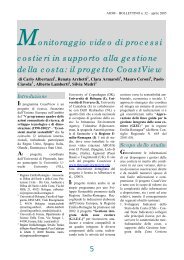The 21st Century climate challenge
The 21st Century climate challenge
The 21st Century climate challenge
Create successful ePaper yourself
Turn your PDF publications into a flip-book with our unique Google optimized e-Paper software.
Special contributionClimate policy as human development (continued)1are not governed exclusively by their own needs. Human beings may not, for example, ‘need’ spottedowls in any obvious sense, and yet if they have reason to object to the extinction of such species, thenthe value of their freedom to achieve this deliberated goal can be the basis of a reasoned judgement.Prevention of the extinction of animal species that we human beings want to preserve (not so muchbecause we ‘need’ these animals in any specific way, but because we judge that it is a bad idea tolet existing species disappear forever) can be an integral part of the human development approach.In fact, the preservation of biodiversity is likely to be among the concerns in our responsible thinkingabout <strong>climate</strong> change.Second, the environment is not only a matter of passive preservation, but also one of active pursuit.We must not think of the environment exclusively in terms of pre-existing natural conditions, since theenvironment can also include the results of human creation. For example, purification of water is a partof improving the environment in which we live. <strong>The</strong> elimination of epidemics, such as smallpox (whichhas already occurred) and malaria (which ought to occur very soon if we can get our acts together), isa good illustration of an environmental improvement that we can bring about.This positive recognition does not, of course, change the signifi cant fact that the processof economic and social development can, in many circumstances, also have strongly destructiveconsequences. Those unfavourable effects have to be clearly identified and firmly resisted, along withstrengthening the positive and constructive contributions of development. Even though many humanactivities that accompany the process of development may have destructive consequences, it is alsowithin human power to resist and reverse many of these bad consequences if timely action is taken.In thinking about the steps that may be taken to halt environmental destruction we have to searchfor constructive human intervention. For example, greater levels of female education and women’semployment can help to reduce fertility rates, which in the long run can reduce the pressure on globalwarming and the increasing destruction of natural habitats. Similarly, the spread of school educationand improvements in its quality can make us more environmentally conscious. Better communicationand a richer media can make us more aware of the need for environment-oriented thinking.Indeed, the need for public participation in ensuring environmental sustainability is criticallyimportant. It is also crucial not to reduce important issues of human evaluation, which demand reflectionand deliberative social assessment, into narrowly technocratic matters of formulaic calculation. Forexample, consider the ongoing debate on what ‘discount rate’ to use in balancing present sacrifi cesagainst future security. A central aspect of such discounting is social evaluation of gains and lossesover time. This is at bottom a deeply reflective exercise and a matter for public deliberation, rather thanone for some kind of a mechanical resolution on the basis of some simple formula.Perhaps the most telling concern here comes from the uncertainty that is inescapably associatedwith any future prediction. One reason for being cautious about the ‘best guess’ regarding the future isthe possibility that if we get it wrong, the world we end up with may be extremely precarious. <strong>The</strong>re areeven fears that what can be prevented now may become close to irreversible if no preventive action istaken without delay, no matter how much the future generations might be ready to spend to reverse thecatastrophe. Some of these predicaments may be particularly damaging for the developing world (forexample, the submerging of parts of Bangladesh or the whole of the Maldives due to rising sea levels).<strong>The</strong>se are critically important matters for public consideration and discussion, and the developmentof such public dialogue is an important part of the human development approach. <strong>The</strong> need forsuch public deliberation is as important in dealing with <strong>climate</strong> change and environmental dangersas it is in tackling more traditional problems of deprivation and continuing poverty. What characterizeshuman beings—perhaps more than anything else—is our ability to think and to talk to each other,and to decide what to do and then to do it. We need to make good use of this quintessential humancapability as much for reasoned sustaining of the environment as we do for coordinated eradication ofold-fashioned poverty and deprivation. Human development is involved in both.<strong>The</strong> 21 st <strong>Century</strong> <strong>climate</strong> <strong>challenge</strong>Amartya SenHUMAN DEVELOPMENT REPORT 2007/2008 29




